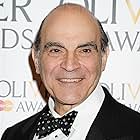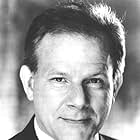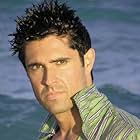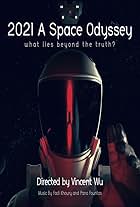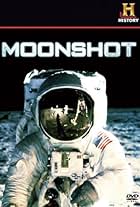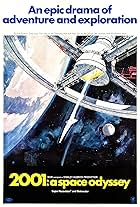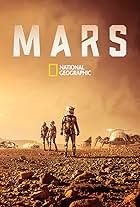This two-part science fiction docu-drama examines the possibilities of a dangerous, manned space mission to explore the inner and outer planets of the Solar system.This two-part science fiction docu-drama examines the possibilities of a dangerous, manned space mission to explore the inner and outer planets of the Solar system.This two-part science fiction docu-drama examines the possibilities of a dangerous, manned space mission to explore the inner and outer planets of the Solar system.
- Awards
- 1 win
Photos
David Suchet
- Narrator
- (voice)
Rodolfo Jiménez
- Extra
- (uncredited)
Maurice Nathan Weert
- Ground controle EVA Sysytems
- (uncredited)
- Director
- Writer
- All cast & crew
- Production, box office & more at IMDbPro
Storyline
Did you know
- TriviaFrom an astronomer's perspective, the data, images and footage provided by the series is as accurate as it can be, considering that by 2004 most of the data was speculated.
- GoofsThroughout the story, the Pegasus crew and Mission Control hold conversations in real time. Transmissions between a spacecraft and Earth would, in reality, take a great deal more time due to the lag caused by the vast distances.
- ConnectionsRemade as Defying Gravity (2009)
Featured review
The subject of this film has always been of interest to me so I viewed it both for its scientific, visionary and entertainment value. Every time a film about space exploration is made, expectations rise as new image technology enables productions to be more realistic and precise. The production team succeeded in doing this to the point where, for someone less aware, the event could have actually been taking place. The landscapes on the planets, from the hot surfaces of Mercury to the frozen rocks on Pluto were just as I imagined them. Until recently we had to use our imaginations based often on artistic impressions gathered from visual astronomical data. But now that probes like the Pioneer and Explorer series have actually been close enough to take real pictures, then what we saw in this film I assume, is close to reality.
I also was glad that Pegasis, the space vehicle, looked realistic and had a crew, it added some drama and again realism. They did not use silly-looking people dressed up in combat uniforms or looking like ex- army drop outs in the crew but members who could have easily been trained astronauts, carefully making sure that both gender and race were included. That is what a international crew would be.
The space walk in Saturn's Rings and the release of the dead astronaut into them was extremely poignant and established the dangers of long term space travel. The hazardous landing on the Comet and the subsequent expelling of black ice from it as turned into the sun, nearly destroying the space vehicle, further demonstrated the dangers. One problem that the film did not deal with was the time delay in signal propagation from Earth control to the space vehicle, although being stated as being many hours it seemed that there was a direct link which is not possible over such vast distances. Earth took control over the space vehicle to move it so its shield blocked the bombardment from the Comet's tail when some members of the crew were injured during the bombardment, thus saving it from destruction but they could not have done that so quickly. This technical issue of transmission time always gives producers of space films a problem and although it did not spoil the film for me, it needs to be addressed if films are to be realistic.
Finally and most importantly, films like this give us a vision of the future - one that is not so far away. It stimulates our imagination and invokes our quest for discovery. Most of the technology and knowledge to make such a journey is available. Reducing the costs and risks to an acceptable level is the challenge that confronts us. Earth is a home but not our prison, a point this film makes very well. Space exploration is there for everybody irrespective of nationality, religion, or culture and ultimately, maybe sooner than we think, we shall make the journey so vividly portrayed in this BBC production.
I also was glad that Pegasis, the space vehicle, looked realistic and had a crew, it added some drama and again realism. They did not use silly-looking people dressed up in combat uniforms or looking like ex- army drop outs in the crew but members who could have easily been trained astronauts, carefully making sure that both gender and race were included. That is what a international crew would be.
The space walk in Saturn's Rings and the release of the dead astronaut into them was extremely poignant and established the dangers of long term space travel. The hazardous landing on the Comet and the subsequent expelling of black ice from it as turned into the sun, nearly destroying the space vehicle, further demonstrated the dangers. One problem that the film did not deal with was the time delay in signal propagation from Earth control to the space vehicle, although being stated as being many hours it seemed that there was a direct link which is not possible over such vast distances. Earth took control over the space vehicle to move it so its shield blocked the bombardment from the Comet's tail when some members of the crew were injured during the bombardment, thus saving it from destruction but they could not have done that so quickly. This technical issue of transmission time always gives producers of space films a problem and although it did not spoil the film for me, it needs to be addressed if films are to be realistic.
Finally and most importantly, films like this give us a vision of the future - one that is not so far away. It stimulates our imagination and invokes our quest for discovery. Most of the technology and knowledge to make such a journey is available. Reducing the costs and risks to an acceptable level is the challenge that confronts us. Earth is a home but not our prison, a point this film makes very well. Space exploration is there for everybody irrespective of nationality, religion, or culture and ultimately, maybe sooner than we think, we shall make the journey so vividly portrayed in this BBC production.
Details
- Release date
- Country of origin
- Official site
- Language
- Also known as
- Voyage to the Planets and Beyond
- Filming locations
- Production company
- See more company credits at IMDbPro
Box office
- Budget
- £4,500,000 (estimated)
Contribute to this page
Suggest an edit or add missing content

